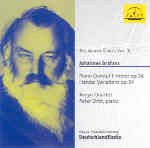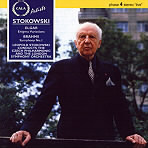

As Brahms Symphony cycles go, this one’s a bit of a dud. It begins pretty well, with Colin Davis leading a taut and energetic account

Antti Siirala doesn’t interpret Brahms’ F minor sonata so much as he defoliates it. Scrupulous to a fault, Siirala irons out the music’s craggy contours,

This may be the best of Karajan’s recorded German Requiems, though that’s not saying much given that the others are nowhere near the competition. Choral

The Belcea Quartet is a young ensemble that, on the evidence of this disc, has an affinity for Brahms’ often knotty chamber works. Its performance

These performances were recently available separately on RCA Living Stereo CDs, and their reappearance on one mid-priced disc is certainly welcome. Heifetz’s legendary singing tone,

The outer movements of Brahms’ monumental Piano Quintet fare best in the Auryn Quartet’s collaboration with pianist Peter Orth, where the music’s polyphonic rigor and

You would never guess from these vital, imaginative, and joyful performances that the conductor in charge was 90 years old. “In charge” are the operative

Lest anyone be confused, this so-called “London” version of Brahms’ German Requiem originally was created in 1869 by the composer as a four-hand piano version

A near-hour’s worth of Brahms choral music might seem daunting to those familiar only with his at-times lugubrious German Requiem, but the four works in

Pierre Monteux is commonly associated with Ravel and Stravinsky, and he won his initial acclaim by conducting the premieres of some of their seminal compositions.
![]()
